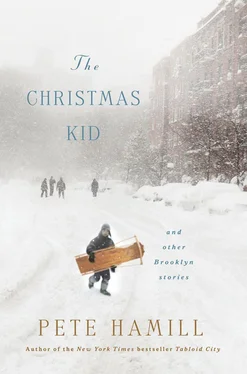Billy insisted that there must be some mistake, and repeated his father’s name. He was told that a man by that name from Brooklyn, New York, had served in 1951 and 1952 on Guam, not in Korea. He gave Billy an address in Brooklyn; Billy’s heart split and flew away and then reassembled itself. The clerk had given his father’s old address, the house he’d shown him so many times on trips to the old neighborhood. Quietly, Billy thanked the young clerk and hung up.
“The poor man,” Billy said to himself. And then he slowly rose and went out to walk alone through the chilly afternoon. Everywhere he walked, he saw his father. He was throwing a football in Prospect Park in the fall, or hitting grounders to kids at Park Circle in the spring. He was standing outside Rattigan’s on a summer afternoon, talking with the other men, quiet and proud. He was marching with the veterans in the parade along the park side of the street, the medals like patches of color on his chest.
And in a grove deep in the park, Billy began to cry again. To cry for his father and the lifelong trap of the lie. He had no idea how the lie had started, and now, of course, it was too late to find out. But he cried for his father’s silence, his isolation, his inability ever to be plain Paulie Fitzgerald. And when he stopped crying, Billy thought that it had been a tough, hard life for his father, after he had shouldered the role, assumed it, and played it out for a lifetime, living every hour of his day with the knowledge that, at any moment, he could be found out. And in that moment, deep in the empty park, Billy Fitzgerald loved his father more than ever.
The next day, there was a Funeral Mass for Paulie Fitzgerald. The coffin was draped with an American flag and there was an honor guard from the American Legion. The organist played “America the Beautiful,” and Billy’s mother was comforted by her son’s decision to take the body to St. John’s after all. At the end of the Requiem Mass, Billy Fitzgerald, the bearer now and forever of his father’s terrible secret, placed his hands on the shoulders of his sons.
“Remember,” he said to them as the Mass ended. “Your grandfather was a hero of the war. A real American hero. Remember that. Don’t ever forget it.”
THE LITTLE GRAY-HAIRED MAN walked into Rattigan’s a few minutes before closing time and went straight to the bar. He was wearing a navy peacoat and faded jeans, and bounced when he walked. He was carrying a Pan Am flight bag. Jabbo Collins knew him right away.
“Harry Willis,” Jabbo whispered, reaching across the bar with both hands to grip the little man’s shoulders. “I don’t believe it.”
“I’ve been lookin’ for ya for weeks,” Harry Willis said. “You ain’t easy to find, Jabbo. Nobody in the old neighborhood knew where you was. Except Father Conners. He knew.”
“He knows everything,” Jabbo said, and smiled. He glanced at his customers: Fitzie was asleep, with his head on his forearms, and Old Margaret was humming the words to “Mona Lisa.” Jabbo whispered: “When did you get out?”
“Three weeks ago,” Harry said, laughing in that high-pitched way that always sounded to Jabbo like the sound of a bird. Jabbo shook his head, ran a hand through his thinning hair, and began to close for the night. He put a shot glass and a bottle of Dewar’s in front of Harry Willis, wiped off the bar, woke up Fitzie and led him to the door, then waited while Old Margaret threw down her nightcap, gathered her coat, purse, and dignity, and walked into the night. Jabbo locked the door and turned to embrace Harry Willis.
“Eight years,” Jabbo said, his old swimmer’s body swelling with a deep breath as he stepped back. “I thought three years was bad. But eight…I don’t know how the hell you didn’t go crazy, Harry.”
“Maybe I did,” Harry said, and threw down a shot. Jabbo turned off all the lights except the night-light over the register; he stashed the night’s receipts under the floorboards; he removed his apron and poured himself a shot and a beer. All through this, Harry was talking. He talked about the people they knew when they were young, and the good times they all had. He talked most about the summers, when Jabbo was the greatest swimmer in the history of Coney Island, and of the Sunset Park pool and Red Hook, too. Jabbo laughed at that, and talked about the women they once knew, remembering all their names and who they married, and which ones were divorced, and the few that were already dead. And Harry talked about the first job he and Jabbo pulled, at the Aladdin Carpet Company one Saturday night, carrying away four rugs, selling them for the price of a couple of pairs of pegged pants.
“Dumb kids,” Jabbo said.
“I don’t know,” Harry said. “We did time. That’s as dumb as you can get.”
There was a long, silent moment. Then Harry said: “Let me ask you something, Jabbo. Would you—”
“Forget it, Harry. Don’t even ask. I’m through with alla that. I been clean for five years and I’m gonna die that way, Harry. I don’t make much more here, but it’s mine. I’m single. I got only my own mouth to feed. I got a nice little apartment. I’m never goin’ back to the can.”
“You never let me ask the question.”
Jabbo sighed and said: “You don’t have to, Harry. I know you. I see what’s in your face, Harry. It’s a scheme, Harry. And schemes are trouble, Harry, and I don’t want trouble anymore.”
Harry took a pack of Pall Malls from his pocket and lit one with a book match. He inhaled, sipped the whiskey. Then he said, “You remember the last job?”
“Yours, Harry?” Jabbo said. “Or mine?”
“The one I did.”
“I never got to talk to you about it, Harry. Remember? You pulled the job and they grabbed you the next day.”
“Yeah,” Harry said. “But they never got the swag. Remember that part? Remember how the papers said it was worth fifty grand? I mean, fifty thousand dollars’ worth of jewelry. Remember that part?”
Jabbo squinted and reached for Harry’s Pall Malls.
“Well,” Harry said. “I know where the stuff is.”
Jabbo said, “You’re kidding me.”
“You got a car?”
“I do,” Jabbo said. “A piece of junk, but it runs.”
“Let’s go for a ride.”
They drove through the empty Brooklyn streets, heading down off the Slope toward the waterfront. Harry gave directions and talked all the way. He talked about the old days, and the fun they had in the Cube Steak on 9th Street, and the night Jabbo flattened Danny Mac in Bickford’s and the night Cacciatore the Cop and his partner, Bill Whalen, locked them up for burglarizing the RKO Prospect. Harry talked about Ocean Tide, too, out at the end of Coney Island, and how terrible he felt because he couldn’t swim, and how proud he was of Jabbo the day he raced Vinnie McAleer out past the third barrel, and thought Jabbo wouldn’t stop swimming until he reached Europe.
“That was all a long time ago,” Jabbo said. And then he slowed the car and looked ahead at the Columbia Street dock.
“It’s out there,” Harry said.
“In the bay?”
“In a metal box, nailed to a piling under the pier.”
Jabbo laughed and stopped the car. “You’re out of your mind, Harry,” he said. “It couldn’t be there after eight years. The tide woulda ripped it away. Kids woulda found it.”
“I think it’s there,” Harry said. “Charlie Barrett put it there for me. Remember him? Big guy, good swimmer. Got killed in a stickup right after. Down in Florida. He told me an atom bomb might take it away, nothin’ else.”
“If he knew where it was, he’d’a taken it himself, Harry,” Jabbo said.
“I put him on the Greyhound that night, Jabbo. He got killed in Lauderdale two days later. When’d he have time?”
Читать дальше












